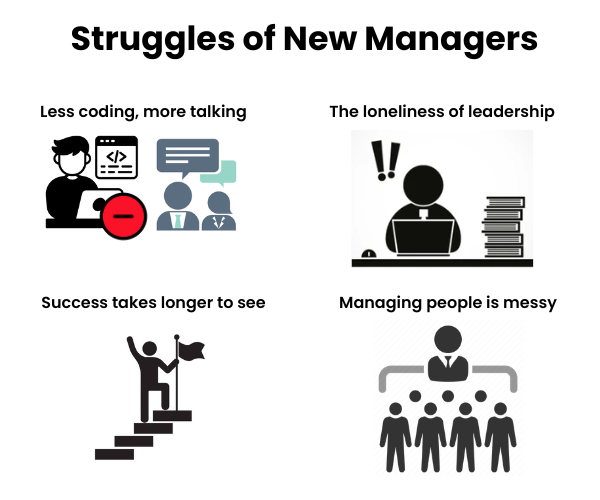Climbing the career ladder often comes with an expectation: at some point, you’ll move into management. It’s seen as a sign of growth, a natural next step. But is it the right move for everyone?
In this episode, Bren Briggs, VP of DevSecOps at Hypergiant, breaks down the realities of transitioning into management—what changes, what struggles arise, and what to do if it turns out not to be the right fit. He shares insights from personal experience, highlighting why some of the best engineers don’t necessarily make the best managers and why leadership isn’t just about managing people.
So, what happens when you realize management isn’t for you? Can you step back without feeling like you failed? And how do companies support employees in making the right career moves?
Let’s dive into Bren’s perspective on leadership, career growth, and finding the right path—whether that’s leading teams or staying in a technical role.
Why Management Is Viewed as the Default Career Progression
The Natural Attraction to Hierarchy
Humans are naturally drawn to structured leadership. Throughout history, societies and organizations have relied on hierarchy to create order, and the workplace is no different. Career paths are designed with leadership layers, making management seem like the next logical step in professional growth.
In many companies, success is often equated with climbing the corporate ladder. Promotions into management are seen as milestones—proof that someone has “made it.” But what if moving up isn’t the right move for everyone?
The Expectation to “Move Up” in a Career
For many professionals, the assumption is simple: career growth means eventually leading a team. From the moment someone starts their career, there’s often an unspoken expectation that they will one day manage others.
Cultural and corporate norms reinforce this idea. Many organizations reward management roles with higher pay, more influence, and greater decision-making authority. As a result, staying an individual contributor (IC) can feel like stagnation—even when it isn’t.
But here’s the challenge: Not everyone thrives in a leadership role, and pushing top talent into management without proper consideration can lead to poor outcomes for both the individual and the company.
Does the Best Engineer Make the Best Manager?
It’s a common scenario—someone is an exceptional engineer, so they get promoted to a management role. But technical excellence doesn’t always translate to leadership success.
Managing people requires an entirely different skill set—mentoring, decision-making, and handling interpersonal dynamics. Without proper training, companies risk losing great engineers and gaining ineffective managers.
The result? Some engineers struggle in management, feeling disconnected from the technical work they love. Others may realize leadership isn’t for them but feel stuck because stepping back is seen as failure.
So, how can organizations create alternative paths for career growth that don’t force talented professionals into management? That’s the next piece of the puzzle.
The Reality of Moving Into a Management Role
Moving from engineering into management isn’t just a title change—it’s a shift in the type of work, how success is measured, and the challenges faced daily. Many engineers don’t anticipate just how different the role will feel.
From Building Systems to Building People
Engineering is about solving technical problems. Management is about solving people problems. The biggest adjustment? Your impact is no longer immediate or measurable in lines of code—it’s seen in how well your team performs. Instead of debugging software, you’re navigating interpersonal dynamics, project priorities, and business goals.
For some, this shift is exciting. For others, it’s frustrating. The dopamine hit of solving a tough problem is replaced by long-term wins—like mentoring a struggling teammate or aligning stakeholders on a tough decision. It’s a different kind of problem-solving, and not everyone enjoys it.
The Unexpected Struggles of New Managers

Many engineers step into management expecting to lead in the same way they worked as ICs. But reality hits fast:
- Less coding, more talking. Instead of deep technical work, your calendar fills with meetings, one-on-ones, and performance discussions.
- Success takes longer to see. A great pull request shows results instantly. A great leadership decision might take weeks or months to pay off.
- The loneliness of leadership. As an IC, you had peers to bounce ideas off. As a manager, some struggles can’t be openly shared.
- Managing people is messy. Code is logical—people aren’t. Conflicts, motivation issues, and performance concerns become part of your daily work.
This is where many engineers start questioning the move. If these struggles feel like barriers rather than challenges to grow from, it might be time to rethink the path forward.
But there’s more—how do you know when management isn’t the right fit, and what should you do next? Let’s explore that next.
Stepping Back from Management: How to Transition Without Stalling Your Career
Realizing that management isn’t the right fit can feel like admitting defeat—but it’s not. It’s about aligning your career with your strengths, and the best companies recognize that leadership doesn’t only exist in management roles.
Why Stepping Back Isn’t a Step-Down
Many engineers hesitate to return to an IC role because of the stigma attached. The fear? That it will look like a demotion or career failure. But true career growth isn’t about climbing the ladder—it’s about finding where you thrive and deliver the most impact. Some of the most valuable employees aren’t managers; they’re highly skilled ICs who drive innovation, mentor others, and shape company strategy without direct reports.
Instead of treating this move as a setback, it should be positioned as an evolution—a shift in focus, not a loss of status.
How to Transition Back Smoothly
If you’re in management but miss the hands-on work, transitioning back requires the right approach:
- Frame it as a strategic move – Talk to leadership about where you can provide the most value, rather than framing it as stepping down.
- Seek technical leadership roles – Positions like Staff Engineer, Principal Engineer, or Architect allow for influence without people management.
- Blend leadership with technical work – Some hybrid roles let you contribute technically while mentoring junior engineers.
- Communicate your career goals early – The earlier you signal your interest in shifting back, the easier it is to transition without disrupting the team.
How Companies Should Support Career Flexibility
Great companies don’t force employees into rigid career paths. They allow movement between IC and management roles without penalty. To make this possible, companies should:
- Normalize career shifts – Moving between IC and leadership roles should be an expected part of career growth, not an exception.
- Provide alternative career tracks – ICs should have as many promotion opportunities as managers, ensuring they can grow in influence, salary, and impact without managing people.
- Create psychological safety – Employees should feel safe discussing role changes without fear of judgment or lost credibility.
By removing the stigma around stepping back, companies retain top talent, improve employee satisfaction, and ensure that people are in roles where they perform at their best.
How Does Transitioning to a Management Role Impact Software Engineering Leadership Skills?
Transitioning to a management role significantly impacts software engineering leadership skills by broadening the focus from technical tasks to team dynamics and project execution. Emphasizing interpersonal communication and conflict resolution becomes essential. Therefore, mastering software engineering leadership techniques effectively ensures that new leaders inspire their teams while driving project success.
Preparing for Management the Right Way: Testing the Fit Before Committing
Becoming a manager isn’t just a promotion—it’s a career shift. Yet, many engineers are pushed into leadership roles without fully understanding what the job entails. Instead of treating management as a permanent step, companies should allow engineers to test the waters first.
Why Management Requires More Than Technical Skills

Many engineers assume that excelling in technical work naturally prepares them for management. But leading people requires a completely different skill set—communication, decision-making, and handling team dynamics. Without proper preparation, new managers can feel lost, disconnected, or overwhelmed.
To prevent this, companies need to support leadership growth before making the role official.
Trial Periods: A Smarter Way to Promote Leaders
Instead of forcing engineers into management with no way back, companies should introduce trial periods where engineers can test leadership before fully committing.
Here’s how it works:
- Temporary leadership roles – Engineers take on leadership responsibilities for a defined period (e.g., leading a project team for a quarter).
- Regular check-ins – Frequent conversations with leadership help assess whether they enjoy the role and feel equipped for it.
- No-pressure transitions – If management isn’t the right fit, they can return to an IC role without losing credibility.
Example: A senior engineer leading a high-visibility initiative may get the chance to oversee planning, cross-team collaboration, and execution. If they thrive, they can transition into a formal management role. If not, they can return to hands-on work without career penalties.
How Companies Can Set New Managers Up for Success
To make management transitions smoother, companies should:
- Offer structured leadership training – Provide workshops or mentorship before engineers take on management roles.
- Encourage small leadership steps – Let engineers gradually build leadership skills by mentoring, leading meetings, or driving initiatives before overseeing a team.
- Make it clear that management is a choice, not an obligation – Employees should feel encouraged to try management but also have the freedom to step back if it’s not for them.
Final Thoughts: Redefining Career Growth on Your Own Terms
For many, moving into management feels like the obvious next step—but it’s not the only path to success. True career growth isn’t about climbing a ladder; it’s about finding where you thrive and create the most impact.
Some engineers make exceptional managers, leading teams and shaping company direction. Others find their greatest fulfillment in solving complex technical challenges, mentoring peers, or driving innovation as individual contributors. Neither path is superior—both are essential to building strong, high-performing organizations.
The key takeaway? Leadership isn’t a job title—it’s the ability to influence, guide, and improve the people and work around you. Whether that means managing teams or mastering your craft as a technical leader, the right choice is the one that aligns with your strengths and aspirations.
So instead of asking, “Should I be a manager?” ask:
- Where do I create the most impact?
- What kind of work excites me?
- How do I want to grow in my career?
No matter the path you choose, growth is about progress, not promotions. The best companies recognize this, making career shifts between IC and management roles a normal, respected part of professional development.
At the end of the day, success isn’t about following a predefined path—it’s about designing one that fits you.




